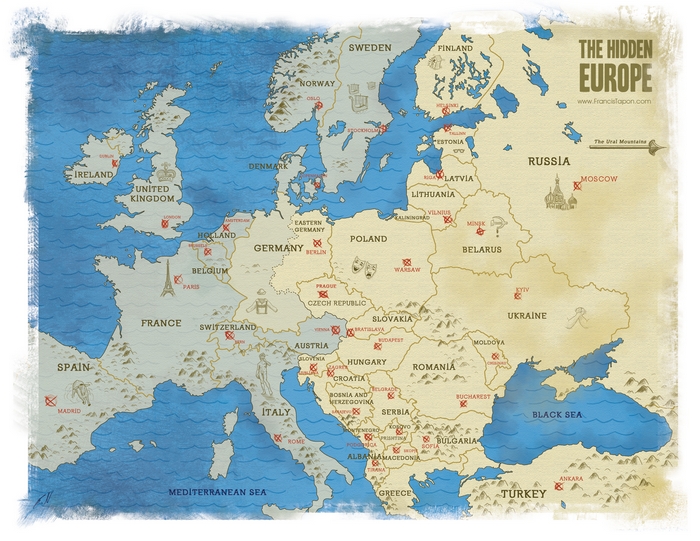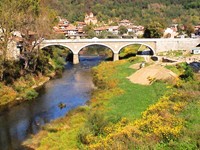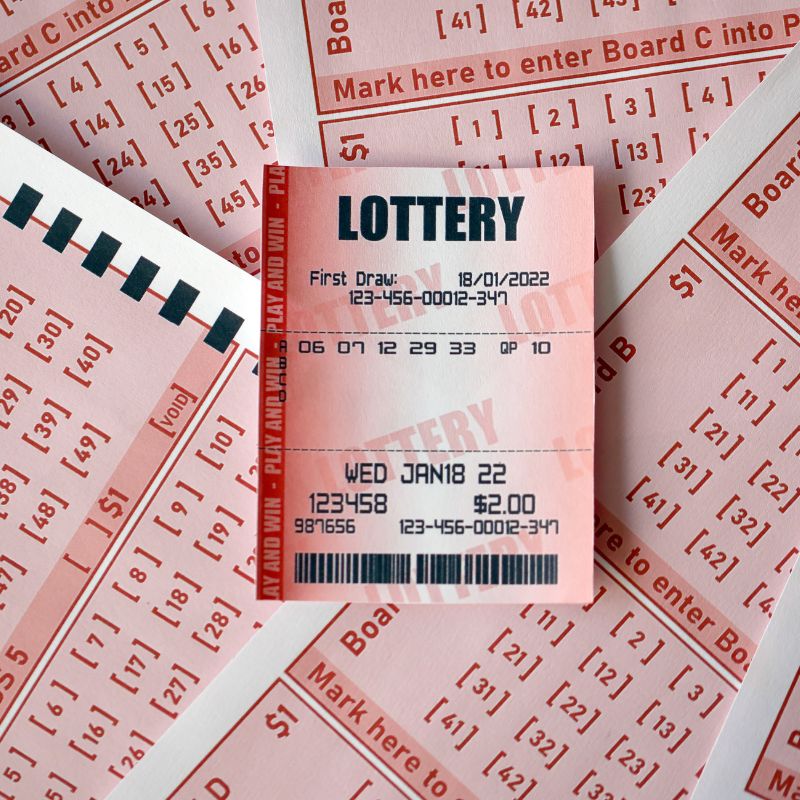Eastern Europe
Exploring the Hidden Europe in 2004 and 2008-2011
In 2004, I visited all 25 countries in Eastern Europe. You'll find the blog entries from that trip here. In 2008-2011, I returned to see what had changed since that time. With these two visits, five years apart, I accumulated enough material for my 750-page book, The Hidden Europe: What Eastern Europeans Can Teach Us.
This blog now has many excerpts from The Hidden Europe. But who the hell reads anymore? Just look at the best photos from Eastern Europe!
This map reflects how I define Eastern Europe. Eastern Europeans love to deny that they're in Eastern Europe. I tackle how and why I define Eastern Europe the way I do in the Introduction of The Hidden Europe.
Before I came to Belarus, I was lucky to meet a Lithuanian, Virginius, who drove me across the country twice in one day!
It's not everyday that you get to cross an entire country by car in a day. Twice.
He was going on a sales call by the Baltic Sea with his co-worker and he let me join him on the 8 hour round trip. While he did his call, I spent several hours exploring the magnificent sand dunes of the Croanian Spit on the west side of Lithuania.
I left for Belarus the next day at 9AM.
The charming border crossing
As I've mentioned, getting a visa to Belarus is no fun.
Getting across the border also sucks.
I left Vilnius in a packed bus of mostly old fat Belarussians. It was very hot and humid. There was no AC or deodorant on the bus.
We stopped at the ominous border and a couple of folks tried to get off the bus to escape the heat (and stench). The bus driver quickly barked at them to stay on board.
Finally, 30 oppressive minutes later the border guard decides maybe he should do his job and collect the passports.
After another 30 minutes, the bus takes off, the assistant starts handing back the passports, and I figure we're good to go. But about 2 minutes later we stop in the heat as the assistant hands back the passport. I wonder, "Why do we have to stop for him to give the passports back?"
I got my answer in a few minutes when we drove up to another spot and everyone got off to get into another line to get our passports stamped. While we stood in line a border guard carefully inspected the bus to make sure there were no stowaways. Why anyone would try to sneak into Belarus is beyond me.
30 minutes later, we all got stamped a few times and everyone was happy. Except the border guards. They're never happy.
In summary, we spent 90 minutes dicking around at the border when the other Baltic bus border crossings had taken less than five minutes. This foreshadowed the efficiency to come. As we drove into Belarus, we passed an endless line of big rigs waiting to leave the country. I just shook my head in dismay.
Defying the law of supply and demand
With a per capita GDP of $6,000 (vs. $36,000+ for the USA), you would think that hotels in Minsk would be cheap. After all, the average Belarussian makes $100 bucks a month. If I could stay in hostels for $10-20/night in places like Finland and Ireland, Belarus should be cheaper, right?
Wrong.
Welcome to communism. Yup, there are still some die hards out there who believe this crap.
Belarus is slowly introducing a few free market ideas to become more cosmopolitan and Westernized. So think of it as communism with a cappuccino.
Price controls
The cheapest hotel I could find said I had to pay 87,000 Roubles. That's $40.
I peered over to their computer and asked what the 26,000 number meant. "Oh, that's for Belarussians."
I split. After several hours I finally found a cute apartment in downtown for $30/night.
There are no government tourist agencies to help you out. And nobody speaks English or any other language besides Russian and Belarussian so it was hard to do anything.
The most useless language in the world
What's wrong? Haven't heard any Belarussian?
Don't worry, neither have the Belarussians.
Although related to Russian, Belarussian a distinct language like Portuguese is to Spanish. It is taught in school and is the official language. I would only hear Russian all day, so I asked several locals:
"So, do you speak Belarussian when you go buy something?"
"No."
"How about when you talk to the government?"
"No."
"When you're hanging out at your house with your friends?"
"No."
"In business?"
"No."
"So when do you speak it?"
"In many classes in school."
"That's it?"
"Yeah."
Dumbfounded, I confirmed and re-confirmed this fact several times. So nobody in the world speaks Belarussian, not even the Belarussians.
Imagine if they used all that energy and time to learn a more practical language. They might be able to help me when I'm lost.
Map of Belarus
Where the hell is Belarus anyway?
I arrived in Minsk (the capital) and visited nearby Dudutki, Mir, and Njasvizh. All these places were interesting and I'm glad I saw them, but you're not missing much.
Basically, the small towns had a few 13-16th century buildings that were nice, but decrepit.
Lots of smelly people in town too. This one guy sitting next to me on another hot bus somehow managed to hold onto the luggage rack over my head for 99% of the 2.5 hour bus ride. Having done rock climbing, I'm amazed he didn't get tired of gripping something so high for so long. But he did, and I had the joy of staring at and smelling his armpit the whole way.
Who needs a laundromat anyway?
That smelly bus ride reminded me that I needed to do laundry. Unfortunately, the Belarussian Government doesn't believe laundromats are necessary. So they don't exist anywhere.
I wasn't staying in a hotel (which will do your laundry), so I had to give my clothes to the company that rented me the apartment for a few days. They lost one of my socks. My clothes are disappearing fast.
Pulse dial
Although cell phones are popular, all the land line phones are still pulse dial (not touch tone). Static-filled connections and dropped calls on are common. If you ever wonder how telecommunications was 40 years ago, come here.
Police state
There are more cops per capita than any other European country. So it's very safe. These thugs, I mean law enforcers, are everywhere.
They can stop cars when they are on foot. Cars are zipping by at 40 miles an hour and all a cop has to do is point at it and the driver will stop on a dime. Routine checks are common. I saw them everyday.
The "President" of Belarus, Alyaksandr Lukashenka, has stripped the authority of the parliament and made the entire government subservient to him. He plans to change the constitution so he can serve 12 years instead of 8. I didn't meet anyone who likes the jerk.
Why Lee Harvey Oswald shot JFK
He lived in Minsk.
I saw his apartment. It was in a good location. But living in this system of government might drive me to shoot someone too.
The Great Patriotic War
Minsk has come back from the dead several times since it was born on March 3, 1067.
It was frequently destroyed by fires throughout the centuries, sacked by Crimean Tatars in 1505, trampled to ruin by the French in 1812, and damaged by the Germans in 1918 and by the Poles in 1919-20. Its greatest suffering came in WWII, when half the city's people perished, including almost the entire population of 50,000 Jews. Virtually every building here has been erected since 1944, when Minsk's recapture by the Soviet army left barely a stone standing.
A whopping 25% of the country died in WWII, many executed in the 200+ concentration camps. The guidebook says that the Museum for the Great Patriotic War (what they call WW II) "will leave your head spinning."
No kidding. The graphic images are overwhelming. Lots of people (including women and children) getting hung and shot. Several mutilated bodies of citizens and soldiers. They should include a barf bag with the admission.
WW II was a big deal throughout Eastern Europe because they bore the brunt of the war's devastation. They had most of the concentration camps. They had to deal with the Nazis storming in, the Soviets pushing them back, and then overstaying their welcome.
Minsk takes a cultural vacation
My guidebook says, "Minsk has quite a lively cultural life." Here's what I found:
- Circus was closed until Aug.
- Ballet closed till Sept.
- Philharmonic hall under reconstruction.
- Dance performances suspended until Nov.
In short, the city has 2 million people and nothing is going on.
Chilling with the 4 Belarussians in my apartment
Wanting some entertainment, I invited 4 Belarussians who were hanging out near my apartment to come in. They stayed until 1:30AM and we had a great cultural exchange. Only one guy didn't speak English. Their main criticism against Americans is that our friendliness is sometimes fake. I've heard this comment many times. We're all smiles, but we don't mean it. So work on your frown.
Gov't encourages students to fail exams
One Belarussian student told me that if you pass the final exams, the government doesn't let you go abroad. They are trying to prevent brain drain.
The student knew of 20 fellow classmates who were in the USA working. They all failed their exams. They are trying to stay in the US.
Going to get some radiation
Almost 20 years ago, Ukraine's nuclear power plant in Chernobyl blew up and dumped 70% of its radioactive isotopes on Belarus.
Here in Minsk, most are no longer worried. However, I did meet one hypochondriac who was afraid of the "radioactive" rain and the "contaminated" food.
Here is a good map of what's still contaminated in Belarus.
In a couple of hours I'm catching a train that is going straight into the nasty southeastern part.
Dark colors on the map indicate lots of radiation, shitty water, and glowing people walking around with three arms.
This should be a hoot.
August 4, 2004
Radiation therapy in Belarus
Imagine if a nuclear power plant melted down in the UK and dropped its fallout on 25% of the country, poisoning all its touched for years.
Belarus is almost the size of the UK and that's exactly what happened to it in 1986.
I'll describe what happened to me when I entered into the heart of the Chernobyl disaster area.
This just in: Alcohol prevents radiation damage
Back in Minsk, I spoke with a husky cop for 45 minutes. She told me that her father had gone to the Chernobyl immediately after the disaster. The government told everyone that alcohol protects you from the effects of radiation. Today, most people I talked to believe this.
This cop told me how the government forced her father to drink liquor. She believes it's because they didn't want him to remember anything.
It worked.
He doesn't remember much.
It does produce a funny scene. Imagine some cop, who can barely stand, slurring, "Don't worry, I'm here to save you from the radiation! Hic!"
Intrigued, I wanted to learn more.
Entering radiation land
About 20% of the forest and 250,000 hectares of land remain contaminated. Although the worst part is in the Chernobyl Exclusion Zone, areas around it aren't exactly the Garden of Eden.
My guidebook stopped short of saying, "DO NOT GO TO THE SOUTHEAST OF BELARUS UNLESS YOU ARE A COMPLETE FOOL. THERE IS NOTHING TO SEE AND YOU WILL GET AN UNHEALTHY DOSE OF RADIATION. YOU IDIOT."
So I booked a trip to Gomel, in the southeast of Belarus.
Meeting Yuri
There was one guy in my train cabin named Yuri. Despite his broken English, we talked for most of the six hour journey.
I asked him, "So if I want to go to a really remote town in Belarus, near the Chernobyl Exclusion Zone, where would you recommend?"
"The town I live in: Dobrush," he answered. "But beware, the government shut off the hot water for one month to save money. They do that every summer. So your hotel won't have hot water."
"Perfect," I thought.
"Has an American ever visited your town?" I inquired.
Yuri answered, "No, I think you will be the first."
"Excellent."
Yuri's dad picked us up and took us on the 30 minute drive to Dobrush. He dropped me off in front of the town's only hotel and wished me good luck. Yuri was leaving leaving to Moscow the next morning, so I needed a lot of luck.
Strange priorities: example #1
My hotel had a TV and a refrigerator, but hot water or no toilet paper. Strange priorities.
Granted the TV barely got two channels and the refrigerator kept my food at just about 2 degrees below room temperature, but still.
For almost $20 a night, I figured they would spring for some TP.
Strange priorities: example #2
The government sells goods to the local state owned enterprises. They allow these monopolies to mark up everything from 0-30%. So of course, being a good little monopoly, the state owned enterprise marks up everything up 30%.
However, the government has a few exceptions which can only be marked up a small amount because they are "essential" products. The short list includes:
Bread
Bottled Water
Milk
Vodka
Now you know the priorities in Belarus.
Vodka is more important than toilet paper here.
Meeting the locals
Dobrush, which means "kind" and "good", is a small town of a few thousand people. Although I met probably over 100 people (including store clerks and random people on street), I only found one person who spoke English, albeit barely. Her name was Irina, and this kind and good woman soon introduced me to her friends and family.
A Russian bath
Dimitri, one of Irina's friends, invited me to have a Russian bath with him. I agreed, not knowing what I was getting myself into. Dimitri, let's just call him Dante, didn't speak any English so he couldn't explain anyway.
The term Russian Bath is misleading. It's more like a Belarussian Sauna. Or in my case: a Belarussian Inferno with a Plant Beating.
Detached from his family's house is a small bath house. I entered inside and I felt like I was in the sauna. Dante told me to strip. I did.
Then he told me to follow him into another room.
"But I thought we were in the sauna..." I mumbled.
The temperature in the next room was much hotter than the first. I was sweating within seconds. After doing a couple of things, Dante told me to go into yet another room. This is when I walked into hell.
I am not sure what temperature it was, but I'm sure that even Satan would be toasty.
Dante told me to lay my naked body on the bench. I laid on my stomach. The bench scorched my body. Sweat pourred down my brow as if I was running a marathon in the Amazon jungle.
Dante brought out this bushy plant with many leaves on it. Holding it in his hand, he started running it all over my body. Occasionally he would whip me with it.
After several tense minutes, he told me that we could take a break from Hades.
We cooled off outside for a couple of minutes and then returned to the inferno. He told me to lie down again. I did. Now flip over, on my back. I did. He brought out that hell-spawned plant again.
I winced.
The naked Dante looked down on me with the big bushy plant in his sweaty hand. He had a malevolent stare, but that could have simply been an illusion in my heat-stroked state.
I closed my eyes and started asking the Lord Jesus for forgiveness. I asked Muhammad too. And the Buddha.
He ran the plant all over my front side. Gave me a few good whacks.
Fortunately, not there.
I couldn't help but wonder, "What the hell am I doing here?"
After an eternity, he stopped and I emerged from hell.
Clearly, I was now a better man.
Porn in Belarus
After the Russian Bath I had a small meal at 2AM with Dante's family and friends. The TV was in the background. Suddenly, I heard English! I was so excited I turned to the TV. A sexy woman was walking across a scene straight out of "Mad Max." Except Mel Gibson wasn't there.
From the narrator's voice, I could tell this wasn't just some B movie. This was an X rated movie.
I warned my hosts that we were about to see some porn. They shrugged. It didn't take long for the movie to "get into it."
This made for another bizarre scene. There I was, enjoying a fine Belarussian meal, listening to everyone speak Russian, and glancing at some hardcore porn in the background.
Who wants a million rubles?
After 10 minutes they finally got tired of the moaning in the background and switched to the Russian version of "Who Wants to be a Millionaire?"
It's the same show except Regis doesn't host it and the grand prize is a million rubles, not a dollars. That works out to about $25,000. But with monthly wages averaging $100/month, you'd feel like a millionaire if you got that.
Feeling like an alien
The American government calls foreigners "aliens." I've always felt that was a derogatory description. However, in my case, it was accurate.
I got double and triple takes whenever I opened my mouth in stores or public places. Kids stared at me. Even Lenin's statue on the Dobrush square seemed to look me over.
Irina recognizes 50% of the people she passes in town. The day after we met she told me that some random people she barely knew were asking her if it was true that an American was in town.
As fast as gossip spreads, I was dumbfounded that it took so long for this community to find out what really happened the day the Chernobyl nuclear reactor melted down.
1984 in 1986
George Orwell's "1984" describes a government that covers up the truth. In 1986 the government of Belarus (with orders from Moscow) waited over a week before admitting that they had a little problem.
But they couldn't completely cover everything from those who were in the middle of the disaster area. After all, things weren't quite exactly normal that day.
Memories of nuclear holocaust
All the older locals I talked with remember that April day was scorchingly hot. The temperature was not normal at all. The sky was an eerie dark color. Nobody had any clue that they were being doused with radiation.
Irina was a little girl when she witnessed the cataclysm. She said, "I remember a violent, horrible wind, unlike any I've ever felt. I knew something was wrong, but I didn't understand what was happening."
Strangely, five years after the horror the middle aged folks fared the worst. According to the locals, those over 60 and under 30 have fared better. However, rates of thyroid cancers among women in Belarus have increased 12-fold in the years since 1986.
Today the locals blame nearly all their aliments on Chernobyl. Having bad joints and high blood pressure is pretty common for anyone over 60, but here they attribute it to Chernobyl. Unfortunately, since the government represses most of the little information it gathers, we may never know the full long term affects of Chernobyl.
Into the Chernobyl exclusion zone
Mikhail, Dante's father, offered to drive me into the Chernobyl Exclusion Zone. The military guards all entrances and foreigners are not permitted. Mikhail was taking a big risk in trying to sneak me in.
As we approached the checkpoint, Mikhail told me not to open my mouth. He will tell the guard that we're visiting relatives who still live in the Zone. Since he lives just 30 miles from the Zone, it's a believable story. The guard took Mikhail's documents. Then he looked at me.
I stopped breathing.
The guard barked out a question in Russian.
I had no clue what he said.
Luckily, Mikhail did. He answered.
The guard waved us through.
The gate opened and I breathed a deep sigh of relief, and some radioactive air.
Radiation therapy
We entered the Exclusion Zone: the most radioactively and chemically contaminated area in the world.
The funny thing is that it doesn't look so bad. Abandoned buildings with broken windows and weeds overtaking them dominate the scenery. There's lots of vegetation, although some of it is mutated if you look closely. No joke.
Mikhail showed me his father's old house that had a small farm in the back. The plants were bearing fruit. I ate some radioactive apples. No kidding. Hey, they were free.
It's just like a ghost town, except a few loonies actually live here. I saw some old ladies sitting outside their little shacks. With no electricity, police, stores, or government services, these survivors tenaciously cling to their homes, because that is all they have.
Forget about it
Although only a couple of dozen or so live in the Exclusion Zone, 2 million Belarussians still live in the hardest hit areas. Why don't they just move?
Did I mention this country is communist?
The labor market is not liquid. The government gives you a job and a house. You move, good luck finding a job and a house. Besides, who are you going to sell your radioactive house to?
Mikhail said the government relocated a few people "just for show." They were probably the folks who were glowing in the dark.
There are some vital industries in the entire Homel region, and the government didn't want to abandon all that production and relocate 2 million people.
Today the government is downplaying the dangers in living in these areas. They are encouraging resettlement and are cutting benefits to those who suffered from the accident.
You can learn more about the Chernobyl Exclusion Zone.
Onto Poland
On my way out of Belarus I stopped at the border town of Brest, which has the best Soviet WW II memorial in the world.
Although part of me was relieved to leave Belarus, there was a part of me that was a bit sad. Its resilient yet friendly people were good to me, even if they didn't always smile at first.
Now I re-enter the world of capitalism and tourists. Poland should be fun and so I'll leave you with a Polish joke:
An American is walking down the street when he sees a Polish guy with a very long pole and a yardstick. He's standing the pole on its end and trying to reach the top of it with his yardstick. Seeing the guy's ignorance, the American wrenches the pole out of his hand, lays it on the sidewalk, measures it with the yardstick, and says, "There! 10 feet long." The Polish guy grabs the yardstick and shouts, "You idiot American! I don't care how long it is! I want to know how high it is!"
August 5, 2004
I guess Yugoslavia wasn't a long enough name for these guys, so they called their country Bosnia-Hercegovina.
What's with the long name?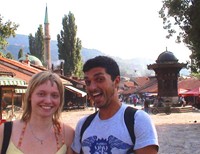
Back in the 15th century Herceg (Duke) Stjepan Vukcic ran the show. So they named Hercegonia after him. I guess Hercegonia is a better than a literal translation which would be "Dukeland."
I'm not sure how Bosnia came up with its name, but the country is made up of these two regions. Hence, Bosnia-Hercegovina, or just Bosnia for lazy people like me.
Now Bosnia gets its two cents
If you managed to read my last book, I mean, email, then you have a bit of a background on what happened in Bosnia. After visiting Serbia, I figured I'd now get the Bosnian perspective. This story is so complicated, but I'm determined to understand it and hear all sides. Just getting to Sarajevo (the capital of Bosnia) was a lesson in the aftermath of the war.
I had to pay off a bus driver in Belgrade, Serbia to get on the bus. Earlier that day I had bought a ticket for the 10PM bus. Turns out the ticket seller didn't understand my crappy Serbian and sold me a ticket for the 10AM bus. The bus driver told me to refund the ticket (where I get 90% of the value) and then give him the cash. He pocketed the cash and let me board the overbooked bus.
I sat next to Marco, an Italian polyglot, for the 8 hour overnight ride. Marco, Maria (a Swede), and I toured much of Sarajevo together. When we arrived, we realized that we far from the city center. Kinda stupid, we thought. The reason was that we were in the Serb Republic in Bosnia.
Serb Republic in Bosnia
Near any border, there is almost always an overlap with the neighboring country. For example, many Mexicans live in the US communities that border Mexico. The legal ones are called Mexican Americans.
Same goes for Bosnia. You had many Serbs living in Bosnia. Hence, the term Bosnian Serb. These Bosnian Serbs (who are Christian Orthodox) felt greater affinity to Serbia than to Bosnia (who are mostly Muslim or Catholic). So when Bosnia demanded independence from Yugoslavia, the Bosnian Serbs disagreed and started a war over it.
Slobodan Milosevic, leader of Serbia, was happy to support the Bosnian Serbs, because he wanted to expand Serbia's size. He figured that if Serbs dominate a certain region in Bosnia, then that region should become part of Serbia.
That's like Fidel Castro telling the US that Miami should be part of Cuba, since mostly Cubans live there. OK, to make that analogy work you have to pretend that the Miami Cubans would also want to be part of Cuba. And that's a bit of a stretch of the imagination.
But the Bosnian Serb region wasn't contiguous, so the Serbs (with Milsoevic's support) proceeded to clean out the area of those who weren't like them. Those who were not Orthodox had to go or be killed. That's like the Cubans of Miami forcing out everyone in southern Florida who can't dance well.
The Bosnian Serbs succeeded and today there is a contiguous region that is 95% Serbs. That region is called the Serb Republic of Bosnia. Although part of Bosnia, it is quite independent, yet not part of Serbia.
That's the result of the 1995 Dayton Accords. Why they went to Ohio to settle this Balkan dispute is a mystery to me.
They still don't get along
We thought the bus from Belgrade would put us in the center of Sarajevo. Instead it left us on the outskirts of Sarajevo, which is in the Serb Republic. Why can't they drop us off at the city center? Because the Serbs and non-Serbs still hate each other so much that they can't even share a stupid bus station!
None of the ATMs in the Serb Republic accepted the cards from a Swede, an Italian, and an American. So we took a taxi and paid in Euros to make the final couple of miles to Sarajevo.
Siege on Sarajevo
Sarajevo is beautiful city nestled among mountains. Wood panelled shops line a nice pedestrian street. What makes the city cool is that it's a perfect blend of Muslim, Catholic, and Orthodox religions. For instance, I walked into Christian Churches and while having a drink I heard a Muslim on a Islamic mosque minaret announcing the call to prayer.
I encourage you to visit, especially during the winter. I can see that it was a great location for the 1984 Winter Olympics. Sadly, ten years later Sarajevo would be a victim of the longest siege in the history of modern warfare.
The siege of Sarajevo lasted from 1992 to 1995. It was fought between the forces of the Bosnian government (who had declared independence from Yugoslavia) and Serbian paramilitaries (who sought succession from the newly-independent Bosnia).
An estimated 12,000 people were killed and another 50,000 wounded during the siege. I saw all the new grave stones near the Sarajevo stadium. It's a sobering site.
An average of approximately 329 shell impacts per day during the course of the siege, with a high of 3,777 shell impacts on July 22, 1993. They have painted the shells on the streets, so now they look like flowers.
I walked down "Sniper Alley" where they are still plenty of signs of artillery holes.
This is as close as I've been to a war zone. If you pay attention the war scars still dot the city, but it's peaceful now.
During the siege Sarajevo citizens had to cut down cut down and burned park trees and benches to keep warm during the winter. How did they eat?
The secret tunnel
Using just simple shovels, the Sarajevo civilians dug a 1km tunnel out to the airport to get supplies from the Red Cross. This was the life line to those who were stuck in the city. NATO bombings finally ended the siege. Here's a case when a country was dying for the US to intervene, but we took our time.
The aftermath
In a way, the Bosnian Serbs got what they wanted. The Serb Republic in Bosnia is almost its own country, although they share the Bosnian currency. They evicted all the non-Serbs out of their region. The only thing they didn't get was being able to part of Serbia.
Although the Dayton Accords said that everyone has a right to return to their original house, few do. After all, if you were a Muslim or Catholic would you move into the Serbian Republic of Bosnia after that war? Let's just say you might not feel too welcome.
Meanwhile, the Bosnians returned the favor and forced most Serbs out of the areas in Bosnia where they were a small minority. Those innocent Serbs also aren't too keen to return to their former homes.
All this fighting for basically one reason: religious intolerance. They speak the same language, they look the same, and they're all nice to me.
My education in the Balkans continues....
September 14, 2004
Once again people warned me not to go to their neighboring country and to be very careful. I’m so 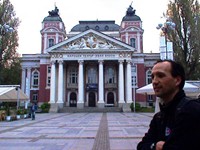
But this time, I was a bit wary. In the previous edition of Lonely Planet they list the Bottom 10 things in Eastern Europe (the new edition doesn’t have this list). Number 8 is “Most of Bulgaria.”
That’s pretty sad. Especially when you see that the rest of the list consists of specific places like some country's National Museum of History. It kinda sucks when experts simply say that your entire country stinks.
A rude awakening
Bulgaria certainly didn't give me a good intro. It wins the award for the bumpiest ride I've taken in Eastern Europe (Albania is a close second). It was an overnight bus from Skopje, Macedonia. I felt I was trying to sleep on a jackhammer.
Sofia doesn't suck
Sofia has a million people, is at the foot of the cool Vitosha mountain range, and is the highest capital in Europe (545 meters / 1600 feet). Although I raced through Bulgaria's capital, I was impressed with it.
There are a couple of monuments (Church and Roman Ruin) that the city has built around.
The highlight is an enormous church dedicated to the 200,000 Russians who died fighting the Turks to help give Bulgaria its freedom.
It helps to follow the map for the rest of my journey.
Rila monastery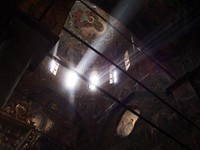
From Sofia I headed south to Rila Monastery. UNESCO Protected, it's an amazing site. It's nestled in the magical and inviting Rila Mountains.
Backpacking in the Rila mountains
Audrey, my host in Skopje, lamented that she doesn't get to go backpacking because the Macedonians aren't into it. For example, one Macedonian guy she was with wanted to hike up a mountain on the paved road with the cars instead of the steeper dirt trail. Who are these guys? Do they get pedicures too?
I flashed Audrey my Appalachian Trail credentials and we headed up the Rila Mountains. It was quite cold. We camped right where the tree line ended because I feared morning dew. We woke up with frost on the tarp. Little did I know that would be the last time I would sleep under my treasured tarp.
Losing the tarp 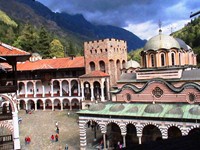
We climbed up to the 7 lakes, despite warns that the trail was treacherous and that the huts were closed. It was magnificent.
I had the bright idea to do some cross country trekking. That was fine until we took a break. I pulled out the tarp to get to the food.
Audrey's knee was swollen so I told her to get moving while I packed up. She probably would have noticed that I left the tarp behind. My beloved tarp. The one I used throughout the Appalachian Trail. Now gone forever. Lost on a lonely mountain, off trail, near a pile of snow. Snow will bury it soon. I suppose that for a tarp it's a good way to go.
I will miss my tarp.
Trail magic
Although my backpack was quite light after the break, I just figured it was because we consumed food and water. I didn't realize my tarp's absence was the other cause.
On the way down, we met two friendly Bulgarian geologists. They offered to drive us 10kms out of their way to get us to a town south of Rila. We made an invisible camp in the city and it was there that I realized that my tarp wasn't around. I was very sad. :-(
It's strange, I've broken my camcorder and lost nearly half my luggage, but losing my tarp bummed me out the most.
Almost pilfered in Plovdiv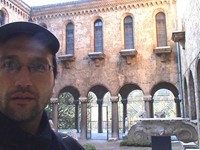
We took a 6AM bus to Plovdiv and soon after we arrived, a well dressed woman tried to pick pocket Audrey's backpack. Although a bit distraught, we shrugged it off.
About 30 minutes later, two 12-year old girls also tried.
Audrey's been ripped off before in Bulgaria. Not sure why they don't target me. Maybe I look poor. I'm certainly not alert. I'm still not sure if my cell phone was swiped or if it just fell off.
In retrospect I should have leveled all these women, but I was too dumbfounded by the experience. Maybe I was too chicken. The 12 year old might have a mean left hook....
Ignoring the pilfering women, Plovdiv was a nice town. The old town is packed with 18th and 19th century homes. It also has a coolest Roman ruin in the country. Nevertheless, Plovdiv is nothing spectacular, but still worth a stop if it's on your way to some place cooler.
Audrey had to go back to work, so I bid her farewell and then studied Bulgarian history.
Some real old history 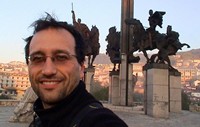
I get so tired of hearing Europeans sniff at the short history of America. Most of the civilized history in Europe is around 1,200 years old. Big deal. America is about 500 years. Both of us are toddlers compared to the Egyptians and Persians.
So I got excited when I learned about the Thracians who came out of the Bulgarian caves and created a real civilization from 6000 BC to 2000 BC. OK, so they were making cute bronze objects while the Egyptians were building pyramids, but at least the Bulgarians can go back that far for their culture.
Here come those nationalists
Turks dominated Bulgaria so strongly that they nearly forgot their origins. But a monk wrote the first complete history of the Slav-Bulgarian people in 1762. Who knows how much he made up, but today Bulgarians take it as fact. Yes, winners write history. He traveled across Bulgaria reading the history to illiterate people and igniting a long-forgotten national identity.
In 1877 Russian finally beat the Turks. Turks ceded 60% of the Balkans to Bulgaria. But the western powers, in all their wisdom, decided to nullify that and redefined the Balkan borders. Those borders haunted the peninsula ever since: during the next 67 years each Balkan country fought up to six wars over border issues!
For example, to finally get rid of the Ottomans, they had the first Balkans War (1912). A year later the winners fought each other and Bulgaria lost.
Bulgaria tried to remain neutral during WWII, but Hitler forced them to join him. When the tide turned against the Germans, the Bulgarians tried to swap sides and join the Allies. No luck: Russia invaded Bulgaria and blessed them with communism.
In the first elections in 1990 Bulgaria had the dubious honor of being the first country in the former USSR to elect communists back to power.
Today Bulgaria is struggling. The EU rates it low on a variety of metrics. The most telling sign is that the population has actually fallen by 503,000 people since 1992. Ayn Rand predicted it: the engine of the economy has stopped after years of oppression.
Armed with that info, I entered the historical city of...
Veliko Tarnovo 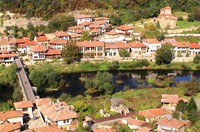
Veliko Târnovo, capital of the Second Bulgarian Empire (1185-1393), is laced with history. The Yantra River winds through a gorge in the centre of the city and picturesque houses cling to the cliffs.
The ruined Tsaravets Citadel, almost encircled by the river, was a vast fortress sacked by the Turks in 1393. The rebuilt Church of the Blessed Saviour at the top of the hill has the best wall paintings I have ever seen. It's very modern (done in 1980s) and quite cool.
You can look down on the foundations of the ruined Royal Palace, home to 22 successive tsars. Execution Rock is a daunting bluff directly to the north, where traitors were once pushed into the Yantra River.
Veliko Târnovo is the best town I saw in Bulgaria. Try to check it out during their summer light and sound shows.
Heading to the border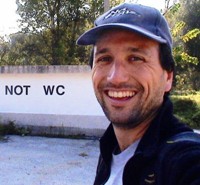
Although I wasn't the target of thieves, for once someone's warnings about the thieves in Bulgaria was true. They exist. OK, so they're not very good at their craft, but they're around.
Romania was the next country on my list. Logic told me that I should get as close as possible to the border. I went to Ruse, Bulgaria. The ruse of taxi drivers wasted my time. They told me there was a way to get through the border, but there isn't. You can't even walk across the border and there are no buses on the other side. I'll tell you what happened in my next email.
Reversing my southbound journey
In this trip, like my Appalachian Trail thru-hike, I have been steadily going south. Dublin, Finland, and Estonia were nice in June. Now they're freezing, while I was in shorts in the Balkans.
But the bad news is that I'm turning around and heading up north into Romania, Moldova and Ukraine. October here isn't like California. Temps are freezing at night and snow dusts the mountains. I'm looking forward to Turkey.
- Cavorting Croatia
- Cruising the Czech Republic
- Fun in Finland
- Hooking up with a Hawaiian in Hungary
- Camping in Kosovo
- Lost in Latvia
- Loving Lithuania
- Mixed up in Macedonia
- Marauding Moldova
- Moving to Montenegro
- A Promenade through Poland
- Roaming Romania
- Surviving Serbia
- Stupidities in Slovakia
- Suicidal in Slovenia
- Uncanny Ukraine
- Final Thoughts on Eastern Europe
- Trekking in Turkey
- Alert in Albania
Your comment will be deleted if:
- It doesn't add value. (So don't just say, "Nice post!")
- You use a fake name, like "Cheap Hotels."
- You embed a self-serving link in your comment.
